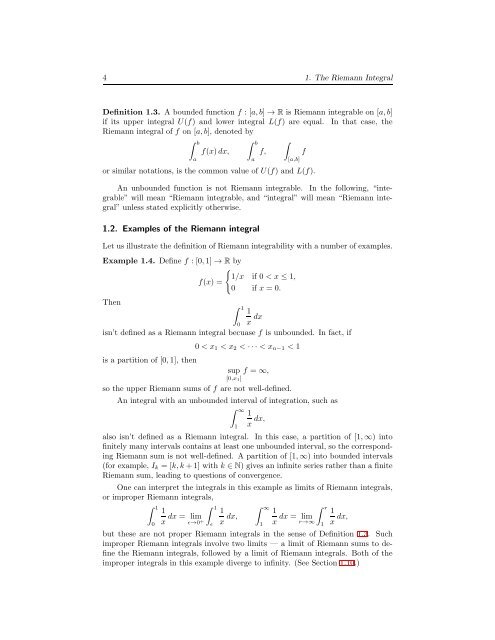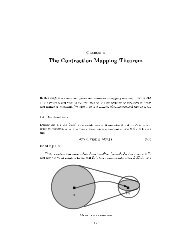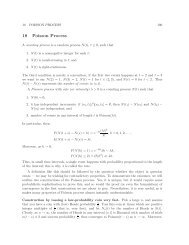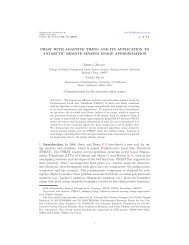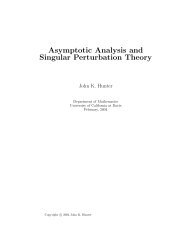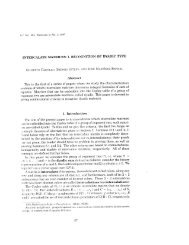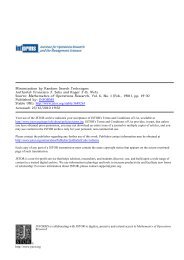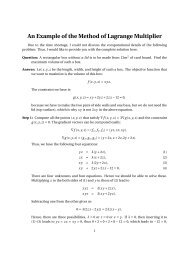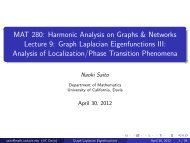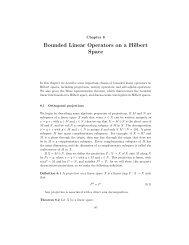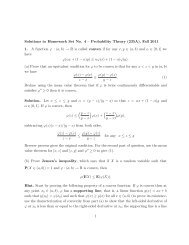The Riemann Integral
The Riemann Integral
The Riemann Integral
You also want an ePaper? Increase the reach of your titles
YUMPU automatically turns print PDFs into web optimized ePapers that Google loves.
4 1. <strong>The</strong> <strong>Riemann</strong> <strong>Integral</strong><br />
Definition 1.3. A bounded function f : [a,b] → R is <strong>Riemann</strong> integrable on [a,b]<br />
if its upper integral U(f) and lower integral L(f) are equal. In that case, the<br />
<strong>Riemann</strong> integral of f on [a,b], denoted by<br />
∫ b ∫ b ∫<br />
f(x)dx, f, f<br />
a<br />
a<br />
[a,b]<br />
or similar notations, is the common value of U(f) and L(f).<br />
An unbounded function is not <strong>Riemann</strong> integrable. In the following, “integrable”<br />
will mean “<strong>Riemann</strong> integrable, and “integral” will mean “<strong>Riemann</strong> integral”<br />
unless stated explicitly otherwise.<br />
1.2. Examples of the <strong>Riemann</strong> integral<br />
Let us illustrate the definition of <strong>Riemann</strong> integrability with a number of examples.<br />
Example 1.4. Define f : [0,1] → R by<br />
{<br />
1/x if 0 < x ≤ 1,<br />
f(x) =<br />
0 if x = 0.<br />
<strong>The</strong>n ∫ 1<br />
1<br />
0 x dx<br />
isn’t defined as a <strong>Riemann</strong> integral becuase f is unbounded. In fact, if<br />
0 < x 1 < x 2 < ··· < x n−1 < 1<br />
is a partition of [0,1], then<br />
sup f = ∞,<br />
[0,x 1]<br />
so the upper <strong>Riemann</strong> sums of f are not well-defined.<br />
An integral with an unbounded interval of integration, such as<br />
∫ ∞<br />
1<br />
1<br />
x dx,<br />
also isn’t defined as a <strong>Riemann</strong> integral. In this case, a partition of [1,∞) into<br />
finitely many intervals contains at least one unbounded interval, so the corresponding<br />
<strong>Riemann</strong> sum is not well-defined. A partition of [1,∞) into bounded intervals<br />
(for example, I k = [k,k+1] with k ∈ N) gives an infinite series rather than a finite<br />
<strong>Riemann</strong> sum, leading to questions of convergence.<br />
One can interpret the integrals in this example as limits of <strong>Riemann</strong> integrals,<br />
or improper <strong>Riemann</strong> integrals,<br />
∫ 1 ∫<br />
1 1 ∫<br />
1 ∞ ∫<br />
dx = lim<br />
0 x ǫ→0 + ǫ x dx, 1 r<br />
1<br />
dx = lim<br />
1 x r→∞<br />
1 x dx,<br />
but these are not proper <strong>Riemann</strong> integrals in the sense of Definition 1.3. Such<br />
improper <strong>Riemann</strong> integrals involve two limits — a limit of <strong>Riemann</strong> sums to define<br />
the <strong>Riemann</strong> integrals, followed by a limit of <strong>Riemann</strong> integrals. Both of the<br />
improper integrals in this example diverge to infinity. (See Section 1.10.)


